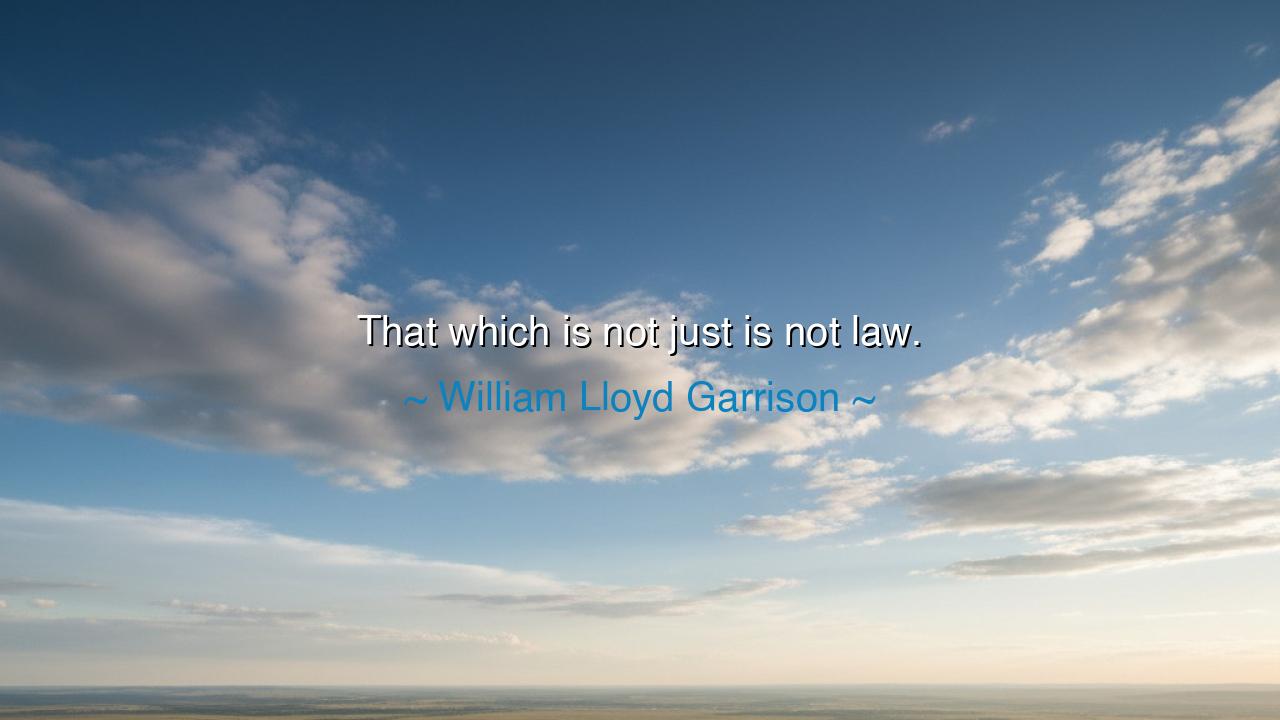
That which is not just is not law.






Hear the fiery proclamation of William Lloyd Garrison, abolitionist and prophet of freedom: “That which is not just is not law.” These words are more than rhetoric; they are thunder spoken against the false authority of oppression. For Garrison, who lived in the age when slavery was clothed in legality, the distinction between what was written in statute and what was written in conscience became a chasm. His declaration was not merely philosophical—it was a weapon, forged to strike at the heart of injustice.
The meaning of this saying rests upon a higher vision of law. Men may pass decrees, parliaments may write codes, and rulers may enforce edicts, but unless these are founded upon justice, they are nothing more than tyranny draped in legal robes. Garrison proclaims that true law cannot be separated from morality, for law without justice is counterfeit. It may command obedience through fear, but it cannot command respect. In this way, his words echo the eternal cry of the ancients: that divine law, the law of right and truth, always stands above the laws of kings.
History bears witness to the power of his conviction. In Garrison’s own time, the Fugitive Slave Act of 1850 declared it lawful to seize escaped slaves and return them to bondage. Courts upheld it, politicians defended it, and officers enforced it. Yet Garrison cried aloud that such statutes were not law, for they violated the very essence of justice. To him, every enslaved man or woman was a living testament that legality can be a mask for evil. His words were a torch, lighting the path for others who would defy unjust commands in the name of higher truth.
The ancients, too, echoed this wisdom. In Sophocles’ tragedy Antigone, the heroine refuses to obey a royal edict forbidding the burial of her brother. She declares that no decree of man can override the unwritten laws of the gods, laws rooted in eternal justice. Though punished, she stands vindicated in spirit, for her defiance embodies the same truth Garrison thundered: what is unjust is no true law at all. Both the prophet and the poet testify that justice transcends human command.
There is heroism in such defiance, but also great cost. Those who declare unjust statutes to be false law are often branded rebels, agitators, or criminals. Garrison himself was reviled, his newspaper burned, his life threatened. Yet his faith endured, and his words helped shape the conscience of a nation. In the same spirit, Martin Luther King Jr., a century later, would echo Garrison’s teaching, declaring in his Letter from Birmingham Jail that “an unjust law is no law at all,” citing Saint Augustine and aligning himself with the same eternal chorus.
The lesson for us is clear: do not confuse legality with morality. That which is written in the books of governments may still be unjust, and it is the duty of the people to discern the difference. When a law exploits the weak, silences the voiceless, or sustains oppression, it demands not compliance but resistance. To obey blindly is to betray justice itself. To question and defy, when conscience demands it, is to honor the higher law that protects the dignity of all.
Therefore, let each one act with vigilance. Study the laws of your land, but weigh them against the scale of justice. Teach your children that the true measure of a law is not its power to punish but its power to uplift. Support leaders who seek fairness above mere legality, and never allow the machinery of government to trample upon the sacred rights of humanity. For as Garrison declared, statutes may pass away, but justice is eternal, and only that which is just deserves the honored name of law.
So remember this saying: “That which is not just is not law.” Let it be written in your heart as a shield against tyranny and a call to courage. For though unjust decrees may bind the body, they cannot bind the soul. And when enough souls rise together in the name of justice, even the mightiest chains of false law are broken, and liberty stands victorious.






AAdministratorAdministrator
Welcome, honored guests. Please leave a comment, we will respond soon